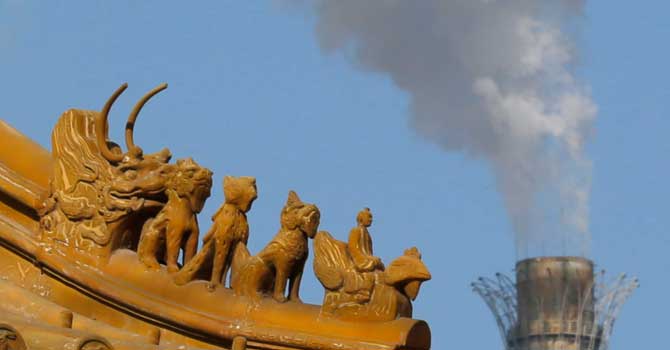
BEIJING: China's drive to fuel more vehicles with cleaner-burning natural gas could reduce oil demand by nearly a tenth equivalent to Turkey's total oil consumption and may help ease its cities' toxic smog problem, too.
The country's rise to become the world's biggest car market has seen rapid growth, too, in oil demand over the past decade, and has contributed to the heavy pollution that chokes its cities. China is now the world's second-largest oil consumer after the United States, burning some 9.6 million barrels per day (bpd) - more than a tenth of global demand.
A Beijing-coordinated campaign to fuel more vehicles with natural gas - part of a drive to reduce costly oil imports and a dependency on coal - could increase gas consumption to as much as 55 billion cubic metres by 2030, predicts energy consultancy Wood Mackenzie - about equal to 840,000 bpd of oil. That's about 10 times more natural gas than is used in vehicles today, and close to 9 percent of China's oil demand.
HAILING COST BENEFITS
Taxi drivers have been quick to see the financial benefits, too, of switching to natural gas. The cleaner fuel is 50-70 percent the price of gasoline and a third cheaper than diesel - savings that have encouraged rapid take-up of natural gas among drivers, and enough to make people like Yu Binghua queue for up to five hours to fill his Volkswagen Jetta taxi.
Yu works in Jiuquan, a city of 400,000 people on the edge of the Gobi desert in China's remote northwest, where all 800 municipal taxis run on gas. A first filling station was built three years ago, Yu said, and a fourth is under construction.
“The money I save is the money I make,” the 32-year-old cabbie said by telephone. While a gas engine can cost almost twice as much as a diesel engine, the payback through using cheaper fuel is just 8 months, said Shao Sidong, president of Westport-Weichai, a diesel engine maker which now also manufactures gas engines.
The push to natural gas comes also as efforts by Beijing to develop the electric car market, through heavy subsidies, have failed to spark, partly because battery costs remain high and charging facilities are few. Experts say electric cars lack mass appeal as they are either too costly for many or not stylish enough for the wealthy.
CAN INFRASTRUCTURE KEEP UP?
China last year had 1.48 million vehicles driving on natural gas, up 48 percent on the previous year, and a huge jump from just 6,000 in 2000, according to leading oil and gas producer China National Petroleum Corp's (CNPC) research institute. The vehicles - mainly taxis, buses and trucks – run on both compressed natural gas (CNG) and liquefied natural gas (LNG).
LNG, gas that is super-chilled to liquid form, is more efficient and can nearly treble a vehicle's driving range over CNG, say experts. That is encouraging the roll-out of more LNG vehicles. At the end of last year, there were 70,000 LNG vehicles on China's roads and 400 LNG stations, the CNPC has reported.
Beijing in October targeted China's vast transport sector - from buses and trucks to taxis and ships - as a preferred user of natural gas.
More than 30 automakers in China make natural gas vehicles, China's Association of Automobile Manufacturers (CAAM) said, led by Shanghai Volkswagen Automotive Co Ltd - a joint venture between Volkswagen AG and Shanghai Automotive Industry Corp (SAIC) - Chongqing Changan Automobile Co Ltd and Zhengzhou Yutong Bus.
The rapid growth in natural gas powered vehicles brings with it the challenge of building an infrastructure to ensure Yu and other drivers across China can fill up their cabs and buses as easily as with gasoline or diesel. For now, natural gas vehicles are mainly found in areas that produce natural gas, in China's west and south west.
OLD KING COAL
The world's top energy consumer, China is the fourth-largest gas user and aims to triple natural gas use to meet about 10 percent of total energy demand by 2020. The take-up in gas will mostly make inroads into consumption of coal.
Beijing is working to boost domestic gas supply, but consumption is growing at such a clip that China is becoming increasingly reliant on LNG imports. State oil giants have struck long-term deals with global LNG suppliers to meet future import needs, with Australia supplying the most.
In a national new energy vehicle development plan released last June, Beijing called for alternative fuels, mainly natural gas, to replace at least 10 percent of transportation fuel by 2015. The natural gas industry, pioneered by small, independent firms such as Xinjiang Guanghui Group, has been given added momentum as bigger state oil companies have stepped in.
“The growth is driven by regulated fuel prices, the environmental imperatives and the national oil companies' efforts to support the use of natural gas in vehicles,” said Zhou Yingying, China gas market analyst at Wood Mackenzie. LNG emits 28 percent less carbon dioxide and 90 percent less sulfur dioxide.












































